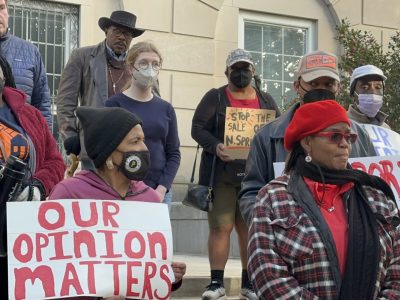by Jordan Green
New details emerge about a 2012 traffic stop by Winston-Salem police that the motorist characterizes as racial profiling. The police and the citizens’ police review board for the most part found no wrongdoing on the part of the officer, but some are uncomfortable with how an in-car camera failed to record the episode. The motorist alleges that he continues to experience harassment from the police.
An African-American East Carolina University student contends that he was racially profiled in 2012 when he was detained by a Winston-Salem police officer after a late-night traffic stop in the affluent West End neighborhood.
David L. Brown II asserted in a complaint that Officer BK Ayers stopped him without reasonable suspicion, subjected him and a friend to racially tinged comments and abusive treatment, and brought in a drug-sniffing dog that tore up his car without probable cause to carry out the search.
Scott Cunningham, who was the Winston-Salem police chief at the time, ruled that Ayers did not violate any policies with either the vehicle stop or the search. Brown appealed to the city’s citizens’ police-review board, which declined to hear the case although some members expressed concern about an in-car camera failing to record the encounter.
Brown and a friend had planned to visit a nightclub on Northwest Boulevard on the evening of March 9, 2012, but decided not to stay because there were only a few cars in the parking lot. As he was traveling away from the club, Brown said he noticed a police vehicle behind him. He found himself in the West End, an unfamiliar neighborhood, and slowed down to try to get his bearings. Ayers activated his lights and stopped Brown at West End Boulevard and Broad Street, Brown said in an interview with Triad City Beat.
“The first thing he said was, ‘What are you doing in my area?’” said Brown, adding that he interpreted the question as a reference to him driving through a predominantly white neighborhood. After looking at their ID cards, Ayers ordered them out of the car and had them sit on the curb in handcuffs, Brown said. Throughout the detention, Brown said, Ayers continually accused him of being a drug dealer and asked him how he could afford his car, a 2004 Infiniti G35. With several other police officers called in for backup, Brown said Ayers humiliated him and his friend by yanking their pants up to their crotch seven or eight times. He complained that the other officers smirked as they witnessed the frisk.
Triad City Beat published a story about the encounter in December, based on details provided by Jon Epstein, a member of the citizens’ police review committee. The name of the complainant was not available to the newspaper at the time. The story detailed concerns about a video camera — installed for the purpose of promoting police accountability and transparency — failing capture crucial portions of the encounter. The story reported in error that the vehicle stop involved a Lexus and a police body camera, based on information provided by a source. Chief Barry Rountree has since stated that the device in question was an in-car camera, a fact that is substantiated by an official email obtained by Triad City Beat.
Cunningham acknowledged Brown’s complaints, including that Ayers treated the two young men with discourtesy, in a June 2012 response to the complaint.
“With regard to the basic reasons for the traffic stop and his contact with you, Officer Ayers acted in accordance with the guidelines of established departmental policies and procedures and did not violate any policies or rules of conduct,” wrote Cunningham, who now serves as chief of police for the town of Kernersville.
Cunningham added, “However, he failed to properly utilize part of his issued equipment; as a result appropriate action was taken.”
Cunningham declined to respond to a question about whether the equipment referenced in his letter was an in-car camera, noting that he is no longer affiliated with the Winston-Salem Police Department. The letter also did not explain what appropriate action means. Cunningham referred questions about the matter to Rountree, who declined to comment for this story.
The former chief’s letter did not directly address the allegation of abusive and disrespectful treatment.
“When the police ridicule a black man, you’re taking away their self-esteem,” said Johnnie Brown, David’s mother. “You don’t yank their pants up to their rectum like that. That’s degrading. He wanted David to be another statistic.”
Brown said when he told Ayers that he was a student at East Carolina University, the officer responded, ‘You know I can make you lose your financial aid.’”
Johnnie Brown questioned why the officer would make the alleged statement.
“Why do they have to threaten his financial aid?” she asked. “If that’s not racial, why do you want to stop a young, black man from achieving his dream?”
David Brown said when he protested the way the officer was treating him, Ayers threatened him with arrest. He said Ayers wrote him a ticket for $263, and repeatedly held it out to him and then yanked it back, taunting him. Johnnie Brown said she believes that if her son hadn’t maintained his composure and reacted to the alleged provocation, he might be dead today.
Ayers could not be reached for comment for this story.
Jon Epstein, the citizens’ police-review board member, has said that the camera quit functioning, preventing documentation of crucial portions of the encounter between the police and the two men.
“There is a scraping sound and then the tape went off,” Epstein said in December. “I’ve been in recording studios, so I know what it sounds like when you switch something off. But just because it’s true in my heart doesn’t mean it holds up as a legal matter.”
Deputy City Attorney Al Andrews told Johnnie Brown in a February 2013 email that the board had engaged in “a very lengthy and robust discussion” about her son’s case.
“Though the board decided not to hold a full hearing, it was announced in open session that it plans to do a more detailed review and analysis of the police department’s in-car camera policies and procedures,” Andrews wrote, “and will formally send a letter of concern to the city manager with certain recommendations.”
The review process remains ongoing almost two years later, Andrews said.
“At the time, that’s what the plan was to do,” Andrews said recently. “They’re still in the midst of that review process, but that letter has not been sent.”
While Brown and his friend were being detained during the March 2012 traffic stop, Ayers said he smelled marijuana, and called in another officer with a drug-sniffing dog to search the car. Brown said in a recent interview with Triad City Beat that he believes his friend had been exposed to secondhand marijuana smoke earlier in the day. Cunningham wrote in response to Brown’s complaint that the department’s use of the drug-sniffing dog to search the car “was within department guidelines.” He added, “Evidence of marijuana was located in your vehicle.”
David Brown said as a result of the search, his seats were torn up, his stereo was yanked out, his rearview mirror was knocked out and the lining in his trunk was removed. He also said an officer kicked the inside of the front passenger door of his car. The city wound up paying for repairs through its insurance policy, but scratch marks can still be seen in the exterior paint, the backseats and passenger door paneling.
Aside from an empty Ciroc liquor bottle, the only contraband the police found in the car was a “wooden grinder with marijuana residue inside,” according to court records. Brown’s friend was charged with possession of drug paraphernalia, an open container violation and consuming alcohol under age. The district attorney dismissed the charges under a deferred prosecution arrangement after Brown’s friend pleaded guilty and completed 20 hours of community service. Court records indicate that the charge can be expunged at a later date.
Ayers charged Brown with impeding traffic and a rear lamp violation related to inadequate illumination of his license plate. Both charges were voluntarily dismissed.
Speaking in general terms about probable cause for vehicle searches, Andrews said smell as a basis is well established in constitutional law.
“If you walk into a bar where there is smoke, the odors from that smoke may get into the fibers of your clothes and be on your body and may follow you outside,” he said. “That’s an indication of you being around smoke. Odors are not unlawful; what generates an odor may be unlawful.”
David Brown cited the impeding traffic charge as evidence of racial profiling. Ayers’ citation states that Brown was driving “at such a slow speed as to impede the normal and reasonable movement of traffic,” with the officer adding that Brown was driving 10 to 15 mph in a 35 mph zone. Questioning the legitimacy of the charge, Brown said there were no other vehicles on the street at the time of the stop, which took place at 12:56 a.m.
Andrews said whether Ayers had reasonable suspicion to make the stop is a matter for the courts to determine.
“That’s more a police matter than a [citizens’ police review] board matter because the police made the decision to make the stop,” he said. “Those kinds of issues of a feeling of a constitutional violation are dealt with in the two levels of the courts — criminal court if there’s a charge, and civil court if there’s a complaint. That’s probably the extent of what I can say in this forum unless there’s litigation.”
Johnnie Brown filed a second complaint against Lt. CP Fish, who was assigned to the professional-standards division in 2012. The Browns said Fish told them they would not be allowed to record the conversation when they came into the police department to file the initial complaint, and that the police would also not record the conversation.
While the Browns honored what they believed was an agreement, they discovered later that the police had in fact recorded the conversation. Johnnie Brown accused Lt. Fish of untruthfulness, a departmental violation.
Cunningham found that Fish “acted in accordance with the guidelines of established departmental policies and procedures and did not violate any policies or rules of conduct,” citing as evidence that recordings did not reveal any instance in which Fish stated that he would not record the conversation. Whether Fish promised to not record the conversation before the recording began remains unclear. Fish could not be reached for comment for this story.
David Brown, who graduated from East Carolina University last year with a degree in sports studies and communications and who now lives in Kernersville, said he has continued to experience unwarranted traffic stops, or harassment, by the Winston-Salem police. In May 2014 he was stopped on Peters Creek Parkway and charged with operating a vehicle with an “unlawfully tinted window.” That charge was also dismissed, and Johnnie Brown said her son had to go to Tint World to get documentation to prove that his tint was at the appropriate level.
The corners of David Brown’s driver’s license are broken off, and each time he has been stopped the ID is further damaged after the officer returns it to him, he said. Johnnie Brown characterized it as a “signal.”
Johnnie Brown said their ordeal with the police department makes her believe the department reflexively shields its officers from accountability when citizens complain about mistreatment.
“The way they treated David, I think his rights as a human being were disregarded,” she said. “He was treated inhumanely, and he was disrespected as a young, black man. It burns me up that [Ayers] was protected by the police department.”
Join the First Amendment Society, a membership that goes directly to funding TCB‘s newsroom.
We believe that reporting can save the world.
The TCB First Amendment Society recognizes the vital role of a free, unfettered press with a bundling of local experiences designed to build community, and unique engagements with our newsroom that will help you understand, and shape, local journalism’s critical role in uplifting the people in our cities.
All revenue goes directly into the newsroom as reporters’ salaries and freelance commissions.





Leave a Reply